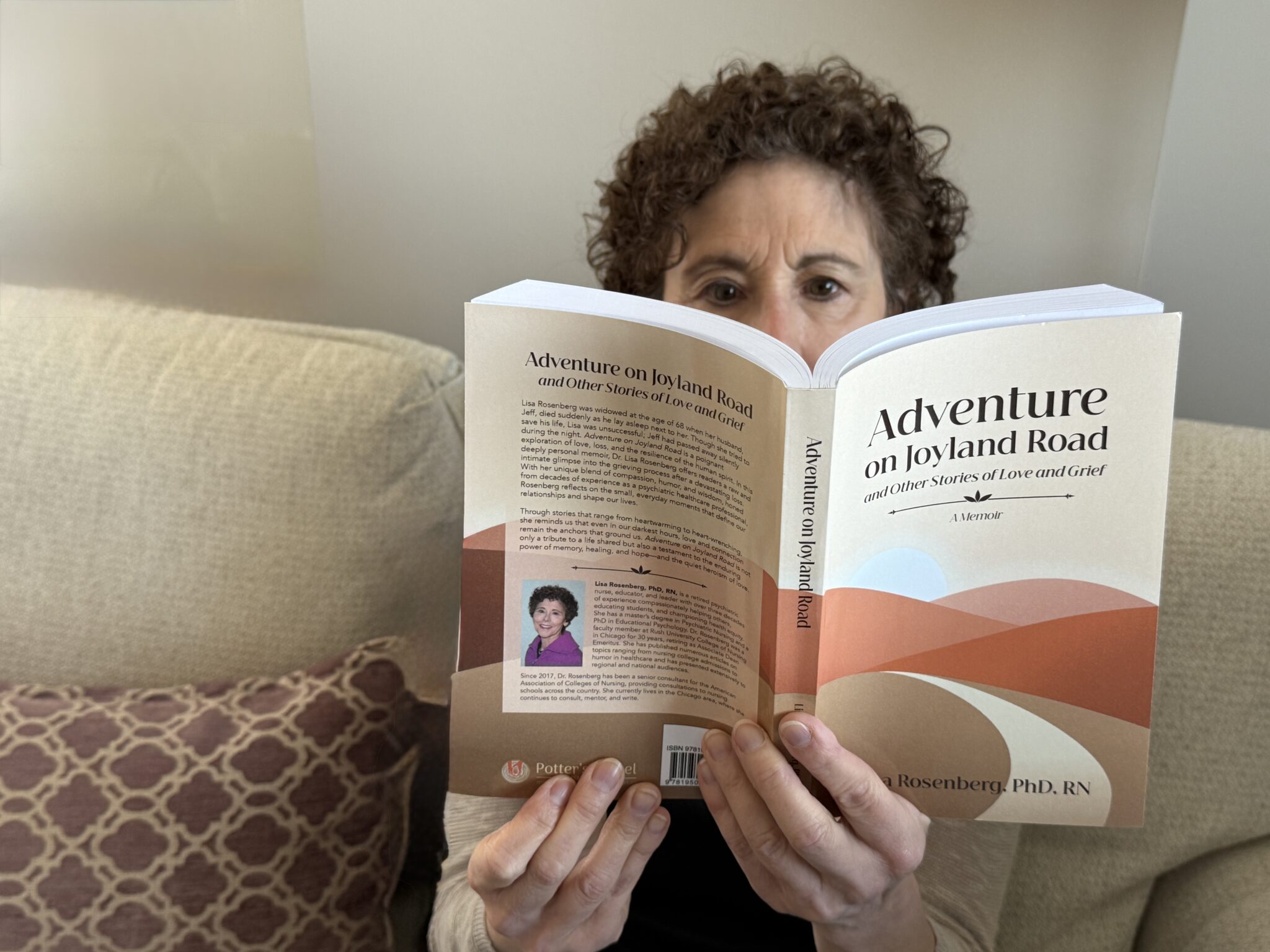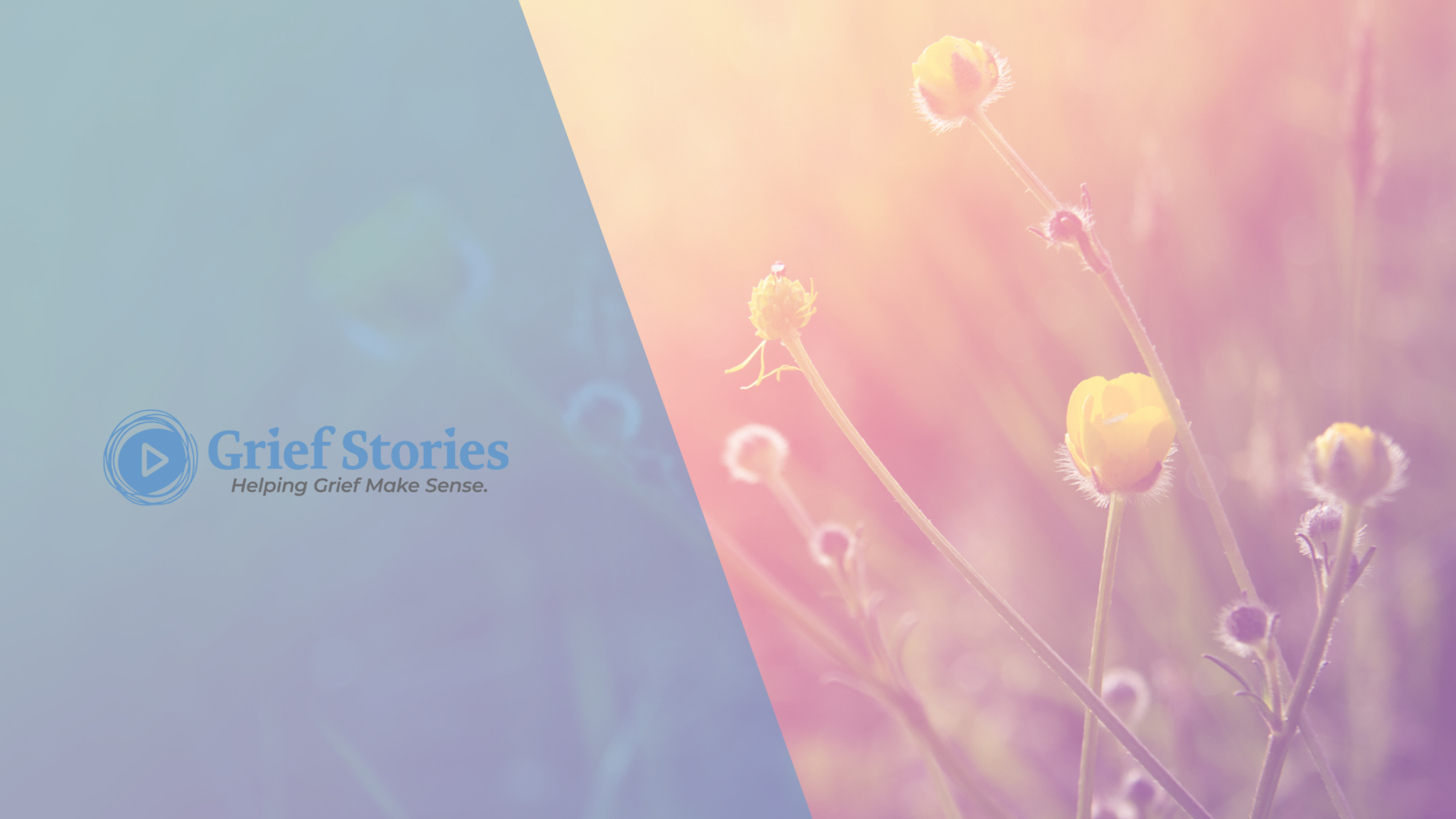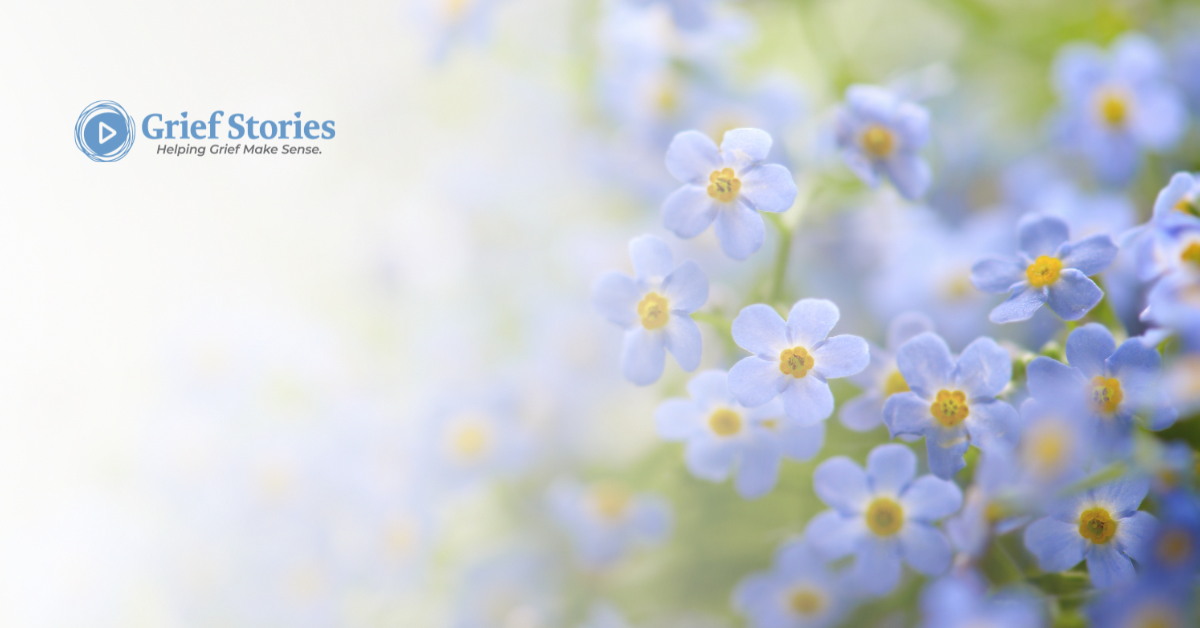Posts Tagged ‘coping’
Left Out: Enfranchising Children’s Grief and Loss
By: Jessica Milette, MSW, RSW
All human beings have the capacity to grieve: people with intellectual disabilities, those living with a traumatic brain injury, and children of all ages. However, many people can experience disenfranchised grief when someone dies. Disenfranchised grief is generally grief that is not usually openly acknowledged, socially accepted or publicly mourned. Society disenfranchises grief and mourners by not recognizing one or more of the following: the relationship between the deceased and a survivor, the importance/impact of the loss, or the need to be a griever. Despite the fact that 1 in 14 children will experience the death of a parent or sibling in Canada, children are often left out of conversations about death, dying and grief further disenfranchising them.
In this post, we’ll break down some common myths about children’s grief, how they can disenfranchise children who are grieving, and some gentle strategies caring adults can use with grieving children.
Myth: Children do not have the capacity to grieve
Reality: Children do grieve, it just looks different
We grieve because we have a connection to the person who died. In infancy, babies make attachment connections with their caregivers. When children experience a death, or a change in this connection they will grieve. Based on a child’s developmental age and stage, how they express their grief will vary.
Tips:
-
Remember, children can express their grief in more physical ways such as experiencing some regression in milestones, like a child who has slept in their own room for some time may need to cosleep with their parent after a death.
-
Get creative with your child: they may not be able to clearly communicate in words but consider how they can play or create art to help them understand their grief and associated feelings?
Myth: Children should be excluded from memorials, funerals, and/or rituals to honour the deceased because it may be “too upsetting” or they will not “understand”
Reality: Children’s understanding of grief is different than adults. They should be given invitations to engage in rituals to honour the person who died
Children’s understanding about death and dying is more concrete, and becomes more nuanced and abstract as they age. Just like when supporting grieving adults, clear communication and honouring autonomy is important with children. Excluding children from the opportunity to participate in activities that honour the loved one’s memory can further disenfranchise children.
Tips:
-
Talk with your child in age appropriate ways about what to expect and what happens at the memorial ritual ahead of time.
-
Ask them in the days leading up, and on the day of the event if they wish to attend. Build a plan for your child to spend time with supportive loved ones if they wish to not attend the large gathering.
-
Be prepared with things that help your child feel supported, and provide opportunities for breaks to move and play outside during the day if they are becoming overwhelmed.
-
Honouring and remembering a loved one doesn’t stop at the funeral, create ways for you and your child to honour the person who died in ways that feel good to them.
Myth: Grief is a linear process that follows a timeline
Reality: Grief shifts and changes across a person’s lifetime, from childhood to adulthood.
As children move through different developmental ages and stages their understanding of grief evolves . All humans, including children can also experience regrief when they meet a milestone after their loved one has died.
For example, a child who had a parent die when they were 9, may experience intense grief reactions as they prepare to graduate from school, learn to drive a car, or have their own children.
Society also attempts to regulate how, when, and how long people may grieve. Suffocated Grief, a term coined by grief expert Tashel Bordere speaks about how a griever can feel punished for their natural expressions of grief. Children can be disenfranchised by teachers, being punished for physical reactions of their grief by being called “disruptive” and being sent to the office for discipline.
Tips:
-
When a child in your life is displaying atypical behavioural patterns, think about – could this be grief from earlier in their life showing up?
-
Continuing to share stories about the person who died with grieving children across their lifespan, creating space to ritualize them, and validating their emotions is important.
Myth: Children should be spared from seeing adults in their lives expressing their painful grief emotions
Reality: It’s important that children see others in their life grieving, and be validated that it’s okay to feel sad, mad, or any other emotion they are experiencing
Grieving adults are also facing deep pain, and we are often taught by society to keep it behind closed doors. Letting children in our life see us feeling sad, and coping with our grief in healthy ways role models to children that it is natural to feel and express grief with people who are caring.
Tips:
-
It’s okay to let a grieving child see a grieving adult feel sad or mad. You can let the child know that grief is natural and we can have different emotions because we miss the person who died.
-
Caregivers need care too. Consider exploring finding your own sources of support in addition to creating opportunities to share with your child about grief, such as using your own support network, exploring therapy, or joining a caregiver and child grief support group.
About Jessica Milette, MSW, RSW:
Jessica Milette is a passionate community-focused grief advocate, fostering change through a culture of collaboration, lifelong learning, best practices, and creativity to build a brighter and kinder future.
Jessica joined the Grief Stories Operations team in 2023, bringing over 15 years of experience providing grief and mental health peer support, in addition to being a registered social worker, practicing since 2018.
Jessica believes in the power of connection; within ourselves, with those who have died, those we are in relationship with, and with our greater communities. Through sharing our stories of grief and loss, we tend to our connection with those who have died and create meaningful connections with others.
Jessica is a white neurodivergent woman living on the traditional territory of the Anishnabek, the Haudenosaunee, the Attiwonderonk, and the Mississaugas of the Credit peoples, also known as Guelph, ON.
Weaving the Tapestry of Love
Learning to become a better person is a wonderful consequence of being in a loving relationship with someone; you’re present in ways that help them grow into their best self. It’s an organic process you flow with on a journey we map out with intention, though in reality, it remains unknowable.
That is why a deeply loving relationship is like weaving a beautiful tapestry. You start with a blank canvas. With every experience a new thread is added—each a different color. The layers of time continue this process, including the good and troublesome of what life has to offer. The richness of color intensifies, fleshed out over the crucible of a relationship. In the end, if the kindness and beauty of love have been yours to share, you’ve woven a work of art.
My Uncle Sam had this type of relationship with his wife, Syl. Sam was remarkable for his easy-going nature. Syl, aka, “the little general,” was not even 5 feet tall, but formidable in demeanor. Sam and Syl had a long, happy marriage of 68 years.
When my uncle was 88, he began to develop some neurological symptoms. Medicine wasn’t working, so surgery was the next option. The day before surgery I was at the hospital. Sam was in good spirits; his usual affable self. I was in the room with just Syl and him. We talked about the upcoming surgery and then the conversation shifted: He said to Syl, “You know I love you” and remarked how beautiful she was. She laughed and rolled her eyes. Syl was being her usual self—a tough nut to crack. Sam was undeterred. He said he loved her now more than ever.
Sam continued to passionately express how much Syl meant to him. Syl smiled and her demeanor softened. I was so riveted by what my uncle was saying that I couldn’t tear myself away, even though it was such a personal moment between them. It was his love letter to her, and he was emphatic in wanting her to know.
After this intimate exchange, I immediately told my cousins about the amazing conversation between their parents. I was so grateful to have been present to bear witness and share the story. Sam spent the rest of the day alert and kibitzing with his family. When he came out of surgery the next day, he was in a coma and never regained consciousness. Sam died a month later. The words he uttered to his wife and family the day before his surgery were the last he ever spoke. Sometimes those who don’t have much time provide great gifts to the rest of us. Sam placed the final stroke on his masterpiece.
By Dr. Lisa Rosenberg
Dr. Lisa Rosenberg is a psychiatric healthcare professional, writer, and widow who never expected to navigate grief so intimately. When her husband, Jeff, died suddenly beside her in the night, she found herself confronting profound loss, love, and resilience—all of which she captures in her memoir, Adventure on Joyland Road and Other Stories of Love and Grief. With a career dedicated to understanding the human mind, Dr. Rosenberg blends deep psychological insight with personal storytelling to explore the lived experience of grief. Her writing is honest, humorous, and deeply compassionate, offering guidance to anyone who has lost someone they profoundly loved.
With a master’s in Psychiatric Nursing and a PhD in Educational Psychology, Dr. Rosenberg spent 30 years as a professor at Rush University College of Nursing in Chicago, retiring as Associate Dean Emeritus. Her career includes pioneering articles on humor in healthcare, extensive presentations, and, since 2017, senior consulting for the American Association of Colleges of Nursing. Based in the Chicago area, she writes, mentors, and consults, offering compassionate wisdom to those navigating grief.
Preparing For and Coping with Special Days
Special Days can be days we have honoured with our loved ones that many others celebrate or more personal dates and milestones with your loved one. As these days approach, it can be difficult to figure out how to move through a Special Day. Do you do what you’ve always done? What do you do if you just want to ignore the day? Special Days can bring up a lot of different emotions, triggers, and opportunities to honour the person who has died.
Why Can Special Days Feel so Hard?
While we are grieving, it can feel as if our world has stopped while the rest of the world seems so happy and carry on as if nothing has happened. After the death of a loved one, there are other transitions and losses we can be grieving while we grieve the death. We may be letting go of old roles while taking on new roles in our family. There may be changes in our relationships and dynamics with others.
Planning Ahead Can Help Us Prepare
There’s no “right” way to feel as a Special Day approaches. You may dread the event, feel on edge, be angry at the number of store displays triggering your grief, or find yourself honouring your loved one and feeling joy.
Planning can help lower anxiety and can help us feel more prepared to cope. Grief can change from moment to moment. If your plans need to change the day of, that’s okay too.
Involve your support network that you usually spend this time with, including children, in conversations about what they would like to do. Everyone is impacted by grief, no matter their age, ability, gender, race, or other identities. You can find more information on grief and supporting grievers with intellectual disabilities here and a post about supporting grieving children here.
Taking Care of Yourselves Through and After Special Days
You may find that your grief is heavier in the lead-up to the Special Day, on the Special Day itself, or that you may experience a wave of grief in the day(s) afterwards.
Here are some gentle reminders:
- You may not be able to do all the things you have done or had planned to do, but be compassionate with yourself. You are allowed to set boundaries around your capacity so you can give yourself plenty of care and rest during this time.
- Grief can impact us mentally, emotionally, and physically. We can find ourselves exhausted in different ways, especially after going through heavy days. Check out our tips on the different ways we can give ourselves rest and care as we grieve here.
- This time of year can have us grievers feeling more overwhelmed or lonely at this time of year. If it feels right, think about it and reach out to people in your network you find supportive. Asking for specific support helps our loved ones give us what we need. The 3 H’s can help us name what type of support we may be needing:
- Heard: To feel listened to, validated, without judgement
- Help: Problem-solving, practical support like cooking, cleaning, childcare, etc.
- Hug: Sometimes we don’t need words of comfort, but a comforting touch like a hug.
- There is no right way to feel on a Special Day. You are allowed to experience moments of joy and lightness on these days while also missing your loved one.
____________________________________________________________________________________
Jessica Milette, MSW, RSW. Grief Stories Healthcare Consultant
Jessica is a registered social worker and owner and of Cultivating Connections. Her expertise includes helping individuals and families facing anticipatory grief, ambiguous loss, disenfranchised losses, and sudden deaths. Jessica believes in the power of connection; within ourselves, with those who have died, those we are in relationship with, and with our greater communities. Through sharing our stories of grief and loss, we tend to our connection with those who have died and creating connections with others.
Jessica is a white woman living on the traditional territory of the Anishnabek, the Haudenosaunee, the Attiwonderonk, and the Mississaugas of the Credit peoples, also known as Guelph, ON.
Finding Joy During the Holidays After Loss When Everything Feels Awful: A message of hope.
My mother died in the middle of the night on January 1, four days before I turned sixteen. I don’t remember much about Christmas the couple weeks before she died, just that we spent a lot of that season in the ICU of the hospital where my mother had birthed my brother and I. For a decade after she died, I hated Christmas. Everything filled me with dread and heaviness. The lights, decorations, and music made my skin crawl- and they were inescapable. At the grocery store, at work, looking out my apartment window onto the main street of a small town. The traditions my family had grown up with weren’t things we did anymore. The holidays weren’t joyful, connective, or fun.
Now, I am thirty-three and the mother of two little humans. I have officially crossed the threshold of being alive longer without my mother than with her. My motherhood has come with many gifts and one of them has been finding joy during the holidays again. I’m writing this cozied in a bright red snoopy sweater that says “merry”. My partner and brother have matching ones. My older kid told me he wants to decorate our house with rainbow-coloured lights, so I bought a strand to hang on the weekend and a small wreath with red berries that reminded me of my mother. I hung the wreath on my front door and thought about how she probably would have hung the lights with my son the same day he had the idea if she were alive.
Last month, my cousin got married and had set up a table of pictures of family members who had died so they could be part of the big day. My beautiful mother was there, smiling brightly out of the frame. My kid noticed it, we have the same picture of her on our fridge. “It’s your mama! She died. We could bring her back and visit her at her house,” said my sweet four-year old. I remind him that death doesn’t work that way, but she lives in our hearts. The next day, he brought her up again and I told him a story about her. It doesn’t feel heavy, even though I still miss her. I feel grateful to feel her presence in our lives. Grief, though still present, changes over time.
If you are someone who is grieving during the holidays and can relate to the first part of my story, I want you to know that it might not feel that way forever. I also want you to know it’s okay to feel however you’re feeling- there are no rules in grief. Here are a few things I’ve learned about grief and the holidays:
Sometimes it can help to make new traditions.
When my older kid was old enough to enjoy Christmas for the first time, I asked my partner, my brother, and other family members if they had any traditions they wanted to start incorporating into the season. We’re still working on building these traditions with my kids, but things like Christmas Eve dinner with my aunt and uncle, Christmas morning with my dad, not wrapping Santa gifts, baking cookies, and hanging rainbow-coloured lights are all slowly becoming ways to find joy, intentionally, together.
- Don’t overextend yourself.
If you don’t want to participate in every (or any) holiday activity- don’t! I didn’t decorate for years, I still avoid malls between November 15-January 1, and there have been some years where I intentionally scheduled work things so I didn’t have to participate at all. It’s okay to be gentle with yourself when it comes to participating in holiday-related things while you’re grieving.
3. Giving can be healing.
I do a lot of my planned giving to charity during the holiday season. I use affiliate programs connected to a breastfeeding support organization I’m passionate about to buy gifts for family and friends, I make donations to organizations that are important to loved ones in their names, and I give to grief resources and hospices as I can. Knowing I am helping other people during a season that has traditionally been hard for me helps me feel connected and supports my continuous healing.
If you find support through the resources we create at Grief Stories, please consider helping us reach our fundraising goal this holiday season so we can continue to produce and distribute free grief resources. Giving is grief support. You can donate here.
___________________________________________________________________________________________
Alyssa Warmland is an interdisciplinary artist and activist. Her work utilizes elements of radical vulnerability, restorative justice, mindfulness, compassion, performance, and direct action.
She is a mother, La Leche League Leader, Board member of La Leche League Canada, writer, podcaster, producer, director, performer, content creator, not-for-profit administrator, and abstract visual artist. Lyss is a strong advocate for fumbling towards an ethic of care, especially when it comes to the topics of birth, matresence, and grief. Most of all, she’s interested in the way people choose to tell their stories and how that keeps them well.
Creating Mother’s Day Traditions as a member of the Dead Mom Club
About a week after Easter this year, I noticed I was starting to feel off. My sleep wasn’t as restful, experiencing tension in my body, at times I was getting irritated with the simplest things. Then while streaming an episode of television, 4 ads back to back all talking about Mother’s Day. Then came the promotional emails, the store displays, and even a banner at the top of my Microsoft Word app directing users to their Mother’s Day templates.
Each year, my relationship with Mother’s Day has changed and it will likely continue to transform for the rest of my life. Early in my grief, I avoided any reminders. It was so difficult to work my part-time job in high school with Mother’s Day displays all around me, hearing about patrons’ plans, and then being asked how my own family would celebrate. I would feel my grief weigh heavily on my body, wanting to sleep until June 1st if I could. My first few Mother’s Days were about survival mode, and getting through my waves of grief.
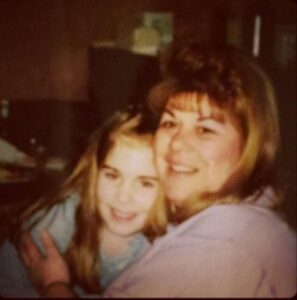
Photo of Jessica and her mother, facing the camera and smiling.
I’m not crushed by my Mother’s Day grief these days in the same way, but I know it is a time of year for me when my grief can show up more. Thoughts about what she would think about streaming platforms; the things I want to tell her; the things I want to thank her for. As my grief has changed these past 18 years, I’ve written letters to my mom, worn pieces of her jewelry, visited her gravesite, bought and written a Mother’s Day card she would have liked, and made some of my favourite childhood recipes of hers.
I would spend many of my Mother’s Days with my grandmother, my mom’s mom as I knew that day held its difficulties for her too. As my grandmother’s health declined over the pandemic, I wasn’t always able or allowed to visit with restrictions. After she died in 2021, I was in a fog by the time Mother’s Day 2022 came around. It felt surreal to me, that on my mother’s side – there are no longer any living maternal presences in my life.
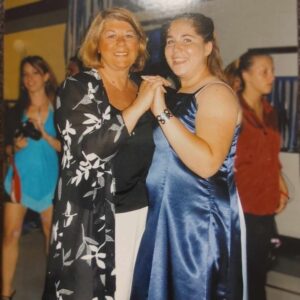
Photo of Jessica wearing a blue satin dress and her mother wearing a long black and
white floral jacket , holding hands as if they are dancing for the camera.
Last year, a friend and another member of the Dead Mom Club were talking about how much this time of year can impact us. These conversations led to something surprising, and beautiful, but also a new tradition that I look forward to engaging in this year. Last Mother’s Day, we had dinner at a nice restaurant downtown, dressed up, and spent an evening talking about our moms. I wore a skirt that belonged to my grandmother and some jewelry that belonged to my mom. My friend also shared items they were wearing or keeping with them that reminded them of their mom. We laughed, we cried, we hugged. It was so cathartic to talk about the things some of our other friends couldn’t quite understand. At times dreading that 2nd Sunday in May, I now know that I can hold space for the difficult emotions that may arise and that I can also look forward to it. To look forward to having dinner with a dear friend, to holding space for the joy, love, and grief we have for our moms, to feel a little less alone on a day that can feel isolating as the rest of the world celebrates it.
_____________________________________________________________________________________________
By Jessica Milette, MSW, RSW . Grief Stories Healthcare Consultant
Jessica is a registered social worker and owner and of Cultivating Connections. Her expertise includes helping individuals and families facing anticipatory grief, ambiguous loss, disenfranchised losses, and sudden deaths. Jessica believes in the power of connection; within ourselves, with those who have died, those we are in relationship with, and with our greater communities. Through sharing our stories of grief and loss, we tend to our connection with those who have died and creating connections with others.
Jessica is a white woman living on the traditional territory of the Anishnabek, the Haudenosaunee, the Attiwonderonk, and the Mississaugas of the Credit peoples, also known as Guelph, ON.
Craig – My Cumulative Grief
Craig – My Cumulative Grief
Craig shares his story of experiencing a series of significant losses over the course of two years. He talks about the shock, grief, and uncertainty he felt during this time, and how he coped with the accumulation of loss.Craig’s story is a reminder that grief is a normal and natural response to loss, but it can be overwhelming when it comes in waves. If you are experiencing grief, it is important to reach out for support from friends, family, or a therapist. There is no right or wrong way to grieve, and everyone experiences it differently. The important thing is to be patient with yourself and to allow yourself to feel your emotions.
Craig – How men process grief
Craig – How men process grief
Craig talks about his personal story of grief and how he learned to process his emotions in a healthy way. He discusses the challenges that men face when grieving, and offers advice on how to find healthy ways to cope with loss.Craig lost his wife, his mother, his job, and his home in a short period of time. He describes how he felt pressured to be stoic and strong for others, and how this made it difficult for him to grieve. He eventually realized that it was important to allow himself to feel his emotions, even the difficult ones.Craig shares some of the things that helped him to process his grief, such as talking to a therapist, writing in a journal, and spending time in nature. He also emphasizes the importance of finding support from friends and family. This video is a powerful and moving story of how one man found healing after experiencing a series of devastating losses. It is an important reminder that grief is a normal and healthy emotion, and that there are healthy ways to cope with it.
Jim – Significant incidents
Jim – Significant incidents
Jim discusses being involved in a significant incident and how it’s normal to feel overwhelmed and ruminate over it. You may even start to drink or use drugs to cope. But it’s important to remember that you’re not alone. Many police officers have been through similar experiences. And there are resources available to help you get through this. One of the best things you can do is talk to a trusted friend or colleague. They can offer support and understanding. You can also seek professional help from a therapist or counselor. They can help you to process your experience and develop healthy coping mechanisms. It’s also important to remember that you can’t change the past. But you can learn from it. And you can move on. Don’t let one incident define you. You are a strong and capable person. And you will get through this.
Antoinetta – Things that help when struggling
Antoinetta – Things that help when struggling
Antoinetta talks about the first time she learned that it was ok that she was grieving and how to unpack all her feelings
Adam – Things that are OK to do
Adam – Things that are OK to do
Adam talks about things he does to cope with grief like singing and crying
Adam – Story 2
Adam – Story 2
Adam discusses his busy life and how he has coped after losing his mother
Learning from Grief
By Noelle Bailey
Grief is weird. Odd start, I know, but that was the sentence I used a lot whenever someone asked me how I was. It was never a constant feeling; it changed day to day. And still does. It’s the full gambit of emotions from sadness to anger to guilt and, though dark, even humour found its way in.
In December of 2019, I lost my father. His health had been declining for several months, and we had started the process to diagnose and begin treatment for what we knew was probably cancer. At his first appointment with his oncologist, he was immediately admitted to the ER. By the next day he was on a ventilator, and within twelve days they came to tell me that the cancer had spread everywhere. We had lost a fight we hadn’t even really begun. In March of 2022, my mother passed away after a 14 year fight with MS. It was a much different process to lose her by degrees over those 14 years, witnessing her own body turn against her while powerless to do anything to stop it.
Those are my two experiences with the strangeness of grief. They were vastly different experiences, but also similar in that they cut me in two and changed my life.
The two biggest things I’ve taken from my grieving process are these:
1. I will, for the rest of my life, miss the conversations we will never have. There are books I’ve read since they left that I would love to talk to my mom about. My dad never got to hear about my new job, and he would have loved it. Pictures people have brought me that I can never ask them about, stories I missed out on hearing. The moments of my life, big and small, that they won’t be here for is the part that takes me under every time.
2. I can grieve however I need to. It doesn’t need to look a certain way or be anything other than what I need. I struggled a lot after losing my mom with the idea that I wasn’t sad enough or broken enough because after watching her long hard battle there was a certain peace lacing itself through the pain. When we laid my parents to rest in the cemetery next to my grandparents, we played “The Rainbow Connection” sung by Kermit the Frog because that’s what my mom had always said she wanted to play to say goodbye. Then my husband, Cale, and I did a shot of Jack, like my dad and Cale did when they went out for my dad’s 60th.
I’ve never been very good at setting boundaries in my life, but I tried very hard to make sure I set them surrounding my grief. To let myself do whatever I needed to process the loss of my parents and not to let anyone tell me I should be acting or feeling a certain way. I laughed at things they would have laughed at, and when I needed to, I cried. I am slowly learning how to live in a world without my parents, and know that I will be for the rest of my life.


